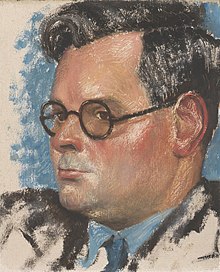Raymond Postgate
Raymond Postgate | |
|---|---|
 Postgate in April 1970 | |
| Born | 6 November 1896 Cambridge, England |
| Died | 29 March 1971 (aged 74) Canterbury, England |
| Occupation |
|
| Language | English |
| Relatives | John Percival Postgate (father) Edith Allen (mother) Oliver Postgate (son) John Postgate (son) Margaret Cole (sister) |
Raymond William Postgate (6 November 1896 – 29 March 1971) was an English socialist, writer, journalist and editor, social historian,
Biography
Early life
Raymond Postgate was born in Cambridge, the eldest son of John Percival Postgate and Edith Allen, Postgate was educated at St John's College, Oxford, where, despite being sent down for a period because of his pacifism, he gained a First in Honour Moderations in 1917.
Postgate sought exemption from World War I
Communist period
From 1918 Postgate worked as a journalist on the
Later career

In the late 1920s and early 1930s he published biographies of John Wilkes and Robert Emmet and his first novel, No Epitaph (1932), and worked as an editor for the Encyclopædia Britannica.[6] In 1932 he visited the Soviet Union with a Fabian delegation and contributed to the collection Twelve Studies in Soviet Russia.[7] Later in the 1930s he co-authored with his brother-in-law G. D. H. Cole The Common People, a social history of Britain from the mid-18th century. Postgate edited the left-wing monthly Fact from 1937 to 1939, which featured a monograph on a different subject in each issue.[8] Fact published material by several well-known left-wing writers, including Ernest Hemingway's reports on the Spanish Civil War,[9] C. L. R. James' "A History of Negro Revolt"[8] and Storm Jameson's essay "Documents".[10] Postgate then edited the socialist weekly Tribune from early 1940 until the end of 1941.[11] Tribune had previously been a pro-Soviet publication: however, the Soviet fellow travellers at Tribune were either dismissed, or, in Postgate's words "left soon after in dislike of me".[12] Under Postgate's editorship, Tribune would express "critical support" for the Churchill government and condemn the Communist Party.[13]
Postgate's
In the postwar period, Postgate continued to be critical of Russia under Stalin, viewing its direction as an abandonment of socialist ideals.[16][17]
Always interested in food and wine, after World War II, Postgate wrote a regular column on the poor state of British gastronomy for the pocket magazine Lilliput. In these, inspired by the example of a French travel guide called Le Club des Sans Club, he invited readers to send him reports on eating places throughout the UK, which he would collate and publish. The response was overwhelming, and Postgate's notional "Society for the Prevention of Cruelty to Food", as he had called it, developed into the
He continued to work as a journalist, mainly on the Co-operative movement's Sunday paper
Postgate wrote several mystery novels that drew on his socialist beliefs to set crime, detection and punishment in a broader social and economic context. His most famous novel is Verdict of Twelve (1940), his other novels include Somebody at the Door (1943) and The Ledger Is Kept (1953). (His sister and brother-in-law, the Coles, also became a successful mystery-writing duo.) After the death of H. G. Wells, Postgate edited some revisions of the two-volume Outline of History that Wells had first published in 1920.
Death and legacy
Raymond Postgate died on 29 March 1971; his wife Daisy committed suicide a month later.[21]
Postgate's younger son,
Notes
- ^ a b Brock and Young, pp.209.
- ^ The Friend, 5 May 1916, 12 May 1916
- ^ Postgate & Postgate, pp.41–65
- ^ Mulholland, Marc (2016). "How to Make a Revolution: The Historical and Political Writings of Raymond Postgate Postgate". Socialist History. 49: 107.
- ^ Postgate & Postgate, pp.107–115
- ^ Postgate & Postgate, pp. 140–164
- ^ Postgate & Postgate, pp. 171–174
- ^ a b Polsgrove, pp. 148–9
- ^ Hanneman, p. 54
- ^ Brewster, p. 279
- ^ Postgate & Postgate, pp. 195–200
- ^ Jones, pp. 48-49
- ^ Calder, p. 79
- ^ Postgate & Postgate, pp. 213–215
- ^ Postgate & Postgate, pp. 243–254
- ^ "...Lenin's Russia was not Stalin's: the present (1951) regime bears no more resemblance to what Lansbury saw than did the Empire of Bonaparte and Fouche to the France of the Convention, and far less than Cromwell's dictatorship did to the Commonwealth of 1649". Postgate, p 202 (1951)
- ^ Blythe, p. 243.
- ^ Postgate & Postgate, pp. 265–269
- ^ Postgate & Postgate, pp. 274–279
- ^ Postgate & Postgate, pp. 282–285
- ^ Postgate & Postgate, pp.340–346
References
- Oxford Chronicle, 10 March 1916
- The Friend, 5 May & 12 May 1916
- Law Reports, 30 Oct 2 Nov, 4 November 1965, The Times Digital Archive
- ISBN 0-224-02258-X.
- Raymond Postgate, Life of George Lansbury. (London, Longmans, Green 1951).
- Ronald Blythe, The Age of Illusion; England in the Twenties and Thirties, 1919-1940. Boston, Houghton Mifflin, 1964.
- John & Mary Postgate, A Stomach For Dissent: The Life Of Raymond Postgate, (Keele University Press, 1994).
- Marc Mulholland, 'How to Make a Revolution: The Historical and Political Writings of Raymond Postgate' in Socialist History (49), 2016, pp. 92–116.
- Audre Hanneman, Ernest Hemingway. Supplement to Ernest Hemingway: A Comprehensive Bibliography. Princeton University Press, 2015. ISBN 1400869382.
- Dorothy Brewster, East-West Passage, Allen and Unwin, 1954.
- ISBN 0815681259
- Carol Polsgrove, Ending British rule in Africa : writers in a common cause. Manchester : Manchester University Press. ISBN 9780719077678
- Bill Jones, The Russia Complex : the British Labour Party and the Soviet Union. Manchester : Manchester University Press, 1977. ISBN 0719006961
External links
- R. W. Postgate Archive Marxists Internet Archive
- Catalogue of the Postgate papers held at LSE Archives
- Correspondence in the Modernist Archives Publishing Project Letters sent and received by Postgate as European representative for Alfred Knopf publishers
